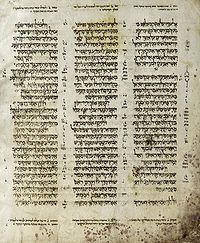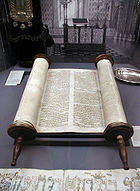- Book of Nahum
-
The book of Nahum is the seventh book of the 12 minor prophets of the Hebrew Bible. It is attributed to the prophet Nahum, and was probably written in Jerusalem in the 8th century BC.
Contents
Background
Nahum prophesied, according to some, in the beginning of the reign of Ahaz (740s BC). Others, however, think that his prophecies are to be referred to the latter half of the reign of Hezekiah (700s BC). Probably the book was written in Jerusalem, where he witnessed the invasion of Sennacherib and the destruction of his host (2 Kings 19:35). And still others support the idea that the "book of vision" was written shortly before the fall of Nineveh[1] at the hands of the Medes and Babylonians [2](612 BCE). This theory is evidenced by the fact that the oracles must be dated after the Assyrian destruction of Thebes in 663 BCE as this event is mentioned in Nah 3:8.[1]
Author
Main article: NahumLittle is known about Nahum’s personal history. His name means "comforter," and he was from the town of Alqosh, (Nah 1:1) which scholars have attempted to identify with several cities, including the modern `Alqush of Assyria and Capharnaum of northern Galilee.[3] He was a very nationalistic Hebrew, and lived amongst the Elkoshites in peace. One account suggests that his writings are a prophecy written in about 615 BC, just before the downfall of Assyria, while another account suggests that he wrote this passage as liturgy just after its downfall in 612 BC.[4][5]
Historical context
Simplified plan of ancient Nineveh, showing city wall and location of gateways.
The subject of Nahum's prophecy is the approaching complete and final destruction of Nineveh, the capital of the great and at that time flourishing Assyrian empire. Assur-bani-pal was at the height of his glory. Nineveh was a city of vast extent, and was then the center of the civilization and commerce of the world, a "bloody city all full of lies and robbery" (Nahum 3:1), for it had robbed and plundered all the neighboring nations. It was strongly fortified on every side, bidding defiance to every enemy. One popular verse is 3:5, "Behold, I am against thee, saith YHWH of hosts, and I will uncover thy skirts upon thy face; and I will show the nations thy nakedness, and the kingdoms thy shame." This is very symbolic showing that Nineveh was known for being a city full of prostitutes.
Jonah had already uttered his message of warning, and Nahum was followed by Zephaniah, who also predicted (Zephaniah 2:4-15) the destruction of the city, predictions which were remarkably fulfilled (625 BC) when Nineveh was destroyed apparently by fire, and the Assyrian empire came to an end, an event which changed the face of Asia.
Archaeological digs have uncovered the splendor of Nineveh in its zenith under Sennacherib (705-681 BC), Esarhaddon (681-669 BC), and Ashurbanipal (669-633 BC). Massive walls were eight miles in circumference.[6] It had a water aqueduct, palaces and a library with 20,000 clay tablets, including accounts of a creation in Enuma Elish and a flood in the Epic of Gilgamesh.[7][8] The Babylonian chronicle of the fall of Nineveh tells the story of the end of Nineveh. Naboplassar of Babylon joined forces with Cyaxares, king of the Medes, and laid siege for three months.[9] Assyria lasted a few more years after the loss of its fortress, but attempts by Egyptian Pharaoh Neco II to rally the Assyrians failed due to opposition from king Josiah of Judah,[10] and it seemed to be all over by 609 BC.[11]
Overview
Part of a series on The Hebrew Bible
and DeuterocanonGenesis · Exodus · Leviticus · Numbers
Deuteronomy · Joshua · Judges · Ruth
1–2 Samuel · 1–2 Kings · 1–2 Chronicles
Ezra · Nehemiah · Esther · Job · Psalms
Proverbs · Ecclesiastes · Song of Songs
Isaiah · Jeremiah · Lamentations
Ezekiel · Daniel · Minor prophetsTobit · Judith · 1–2 Maccabees
Wisdom (of Solomon) · Sirach
Baruch · Letter of Jeremiah
Additions to Daniel / to Esther Bible portal
Bible portalThe book of Nahum consists of two parts:[12]
Chapter one shows the majesty and might of God the LORD in goodness and severity.[13]
Chapters two and three describe the fall of Nineveh in 612 BCE. Nineveh is compared to Thebes, the Egyptian city that Assyria itself had destroyed in 663 BCE.[1] Nahum describes the siege and frenzied activity of Nineveh’s troops as they try in vain to halt the invaders. Poetically, he becomes a participant in the battle, and with subtle irony, barks battle commands to the defenders. Nahum uses numerous similes and metaphors. Nineveh is ironically compared with a lion, in reference to the lion as an Assyrian symbol of power; Nineveh is the lion of strength that has a den full of dead prey but will become weak like the lion hiding in its den. It comes to conclusion with a taunt song and funeral dirge of the impending destruction of Nineveh and the "sleep" or death of the Assyrian people and demise of the once great Assyrian conqueror-rulers.
Themes
The fall of Nineveh
Nahum’s prophecy carries a particular warning to the Ninevites of coming events, although he is partly in favor of the destruction.[5] One might even say that the book of Nahum is "a celebration of the fall of Assyria."[2] And this is not just a warning or speaking positively of the destruction of Ninevah, it is also a positive encouragement and "message of comfort for Israel, Judah, and others who had experienced the "endless cruelty" (3:19) of the Assyrians."[2] The prophet Jonah shows us where God shows concern for the people of Nineveh, while Nahum’s writing testifies to his belief in the righteousness/justice of God[14] and how God dealt with those Assyrians in punishment according to "their cruelty" (Nahum 3:19). The Assyrians had been used as God's "rod of [...] anger, and the staff in their hand [as] indignation." (Isaiah 10:5)
The nature of God
From its opening, Nahum shows God to be slow to anger but that He will by no means clear the guilty, but will bring his vengeance and wrath to pass. God is presented as a God who will punish evil but will protect those who trust in Him. The opening passage (Nahum 1:2-3) states: "God is jealous, and the LORD revengeth; the LORD revengeth, and is furious; the LORD will take vengeance on his adversaries, and he reserveth wrath for his enemies. The LORD is slow to anger, and great in power, and will not at all acquit the wicked". God is strong and will use means, but a mighty God doesn't need anyone else to carry out vengeance and wrath for him.
Nahum 1:3 (NIV) The LORD is slow to anger and great in power; the LORD will not leave the guilty unpunished.
Nahum 1:7 (NIV) The LORD is good, a refuge in times of trouble. He cares for those who trust in him
Importance
God's judgement on Ninevah is "all because of the wanton lust of a harlot, alluring, the mistress of sorceries, who enslaved nations by her prostitution and peoples by her witchcraft." (Nahum 3:4 NIV). Sexual infidelity, according to the prophets, related to spiritual unfaithfulness.[15] For example: the land is guilty of the vilest adultery in departing from the LORD.(Hosea 1:2 NIV) The apostle John used a similar analogy in Revelation chapter 17.
References
Books of Nevi'im (Hebrew Bible) First Prophets 1. Joshua 2. Judges 3. Samuel 4. Kings Later Prophets 5. Isaiah 6. Jeremiah 7. Ezekiel 8. 12 minor prophets - ^ a b c Kent H. Richards, Nahum Introduction: The Harper Collins Study Bible, (New York: Harper Collins, 2006) 1250
- ^ a b c Michael D. Coogan, A Brief Introduction to the Old Testament, (Oxford: Oxford University Press, 2009) 297-298
- ^ Nahum at The Catholic Encyclopedia
- ^ Heaton, E. W., A Short Introduction To The Old Testament Prophets, p. 35, Oneworld Publications, P.O. Box 830, 21 Broadway, Rockport, NA 01966, ISBN 1-85168-114-0
- ^ a b Nahum at aboutbibleprophecy.com
- ^ Destruction of Judean Fortress Portrayed in Dramatic Eighth-Century B.C. Pictures at the Biblical Archaeology Review website
- ^ Nineveh at www.saudiaramcoworld.com
- ^ Creation Myths in The Ancient Near East at darkwing.uoregon.edu
- ^ Fall of Nineveh Chronicle at Livius - Articles on Ancient History
- ^ The End of Judah at the Quartz Hill School of Theology website
- ^ Assyria 1365-609 B.C. at The Metropolitan Museum of Art website
- ^ Clark, David J.; Hatton, Howard A. (1994). The Books of Nahum, Habakkuk, and Zephaniah. New York: United Bible Societies. p. 1. ISBN 0-8267-0130-2.
- ^ See also Romans 11:22
- ^ Nahum at earlyjewishwritings.com
- ^ Centre Column Reference Bible, (Nashville: Thomas Nelson Publishers, 1994) 1262
External links
- Jewish translations:
- Nachum - Nahum (Judaica Press) translation [with Rashi's commentary] at Chabad.org
- Christian translations:
- Online Bible at GospelHall.org (ESV, KJV, Darby, American Standard Version, Bible in Basic English)
- Nahum at The Great Books (New Revised Standard Version)
- BibleGateway
- Nahum - King James Version
 Chisholm, Hugh, ed (1911). "Nahum". Encyclopædia Britannica (11th ed.). Cambridge University Press. This article also contains a section on the Book of Nahum.
Chisholm, Hugh, ed (1911). "Nahum". Encyclopædia Britannica (11th ed.). Cambridge University Press. This article also contains a section on the Book of Nahum.
This article incorporates text from Easton's Bible Dictionary (1897), a publication now in the public domain.
Book of NahumPreceded by
MicahHebrew Bible Succeeded by
HabakkukChristian
Old TestamentBooks of the Bible Principal divisions Orthodox- Enoch
- Jubilees
- 1-3 Meqabyan
- Paralipomena of Baruch
Subdivisions Development Manuscripts See also Categories:- Minor Prophets
Wikimedia Foundation. 2010.



